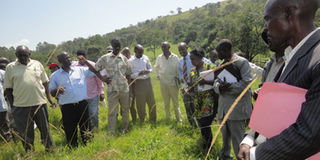Farmers reaping big from pasture seeds

Tumusiime, the chairperson, shows the different types of pastures that the farmers’ group produces seeds for. Right, members gathered for an on-site instruction. photos by Otushabire Tibyangye
Time has come for farmers to think beyond what they have been practicing as the population grows and land remains a constant.
Some of the changes that are inevitable are reduction of herds, improvement of animal breeds both for dairy and beef, improved seeds and integration of animal and crop husbandry.
This change is taking shape in Kazo Town Council, Kiruhura District, under Kazo Dry Land Husbandry Agro Pastoralists Association (KDHAPA).
Erison Tumusiime, chairperson of the 33-member association, says they saw a need to jointly address the challenges facing them especially of pastures because Kiruhura District is in the Ankole cattle corridor, which is a dry land.
“We came together in 2005 to create an enabling environment for livelihood improvement because we face adverse climatic conditions especially during droughts,” he says.
During dry seasons, farmers are faced with shortage of water and pastures.
The water problem has been solved through construction of valley tanks thus leaving the problem of pastures glaring.
Most people in Nyabushozi and Kazo counties practice free range grazing, which not only wastes pastures but also increases risks of spreading cattle diseases like East Coast fever, foot and mouth among others.
Activities
KDHAPA started seed production in 2013 with three acres of Rhodes grass (Chloris Gayana) and 0.75 acres of centro legume pasture. Total harvest was 600kg and 150 kg of seeds respectively. This earned a total of Shs4.5m at Shs25,000 per kilogramme.
Some of the activities carried out include pasture seed production, bulk marketing, dairy production, multiplication of other quality seeds especially beans.
“We do conservation, multiplification and seed collection as well as making hay and silage,” Tumusiime says.
Some of the pastures and legumes include chloris Guyana, stylo, centro, lab lab.
Other activities include dissemination of information to farmers, advocacy and networking with local, regional and international organisations such as Makerere University, UNDP Millennium Villages project, Integrated Seed Sector Development Program (ISSDP), and Mbarara Zonal Agriculture Research Development Institute/NARO.
Achievements
The group has been able to bring on board various organisations to identify challenges in pasture seed production.
The group also has established a pasture bank of 25 species where farmers can access seeds for multiplication and farm improvement. They have also increased pasture acreage from three to 21 acres and they expect to harvest about five tonnes of pasture and one tonne of seeds.
This will earn Shs125m from the seed sales and Shs 10m from legumes.
This has encouraged membership growth from five in 2005 to 35 and is expected to grow to 100.
Membership is expected to rise because the general public has realised the benefits of supplementary feeding
“Many have expressed willingness to start pasture seed production and practicing modern farming technologies for increased household incomes,” Tumusiime says.
Farmers have fenced their farms, set up paddocks, and have started acquiring better dairy breeds. Subsequently, their incomes have gone high from the sales of milk, pasture seeds, hay and legumes.
Challenges
Some of the challenges farmers face are the erratic weather patterns.
They also face scarcity and high cost of foundation seeds, lack of standard storage falicities, poor adoption of range land management technologies by farmers.
Phiona Ninsiima, an agri-business expert, ISSDP, says the organisation will ensure farmers get quality seeds through supporting the association.
“We are determined to see farmers produce optimally pastures by accessing improved seeds not only for their cattle but also food for themselves like beans, orange fleshed potato, maize and millet,” she says.
On the erratic weather patterns she advises farmers to plant trees. Some of which can provide food for humans and livestock and help check climatic change.
Future plans
KDHAPA intends to establish a resource centre where farmers can access information on pastures, rangeland management and animal nutrition.
Other plans are to increase membership from 30 to 100 and diversify the seed business to include other varieties which other seed companies are not handling.
Dick Bugingo, a dairy farmer, cautions that farming is a learning process which never ends so farmers should never give up.
He advises the group to work as a team if they are to succeed: “Work in cooperatives and not as individuals. Let us approach farming as business.”




